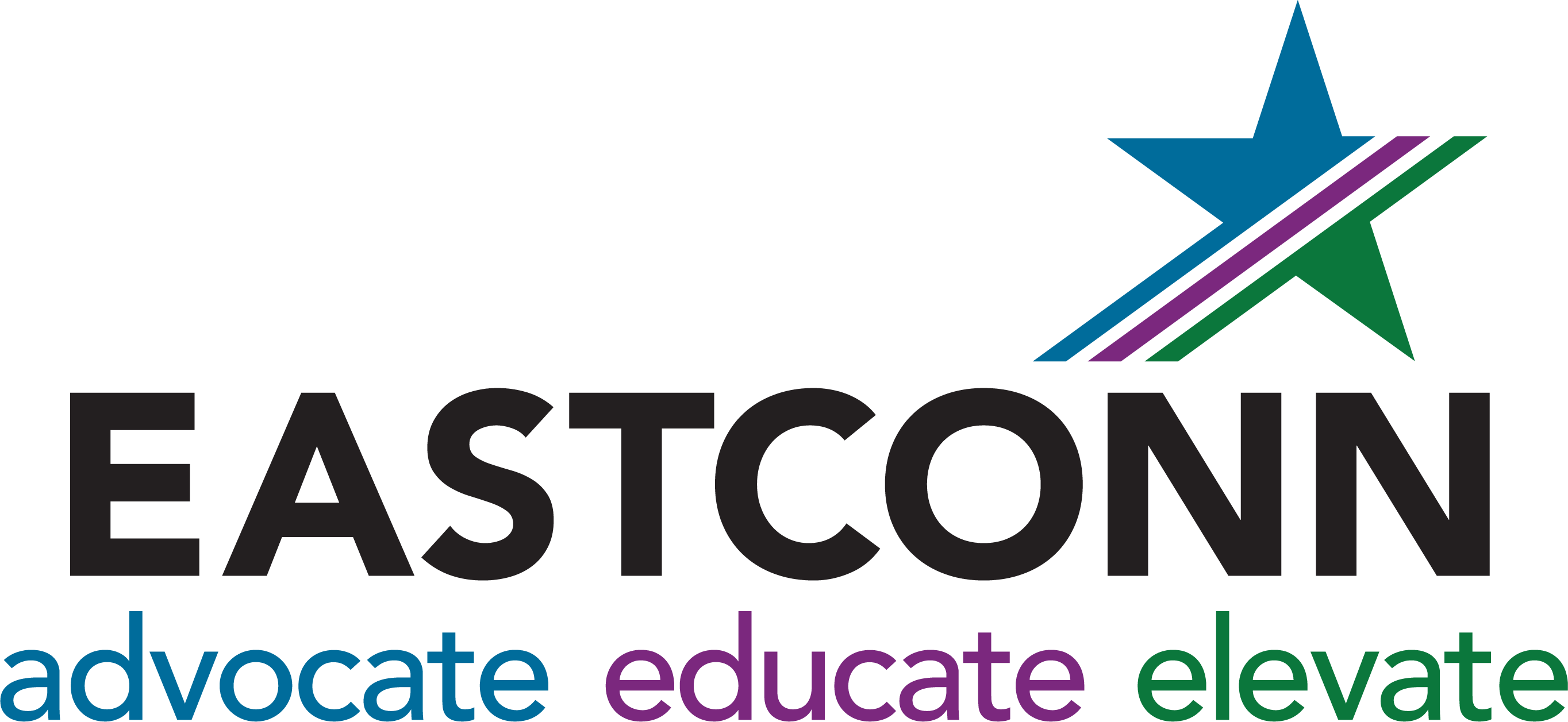Advancing Consultation & Coaching to Empower Student Success (ACCESS)
Advancing Consultation & Coaching to Empower Student Success (ACCESS)
ACCESS is a dynamic team of multi-disciplinary practitioners who partner with Connecticut public schools to implement evidence-based, prevention-oriented practices and systems through ongoing coaching and consultation.
EASTCONN offers assessment, consultation, and professional development in a variety of areas to support districts, programs and individual student needs in maximizing student outcomes.
Team members provide expertise, guidance and support to help districts develop and implement effective frameworks and interventions to improve student outcomes, address diverse learning needs, and foster a culture of community and success within educational settings.
Please note that ACCESS contributes to the development and dissemination of evidence-based practices through the publication of empirical research and the presentation of that research to scientists and practitioners at national and regional conferences.

Professional Learning and Training Resources
Professional Learning and Training Resources
Free Online Training Series
FREE online training series for all educators and paraeducators:
- Flip the Script: Rethinking Reactions to Challenging Moments
- Proactive Strategies for Engaging All Students
- Function-Based Thinking: Understanding the ‘Why’ of Student Behavior
- Catch it, Track it, Change it: Data with a Purpose
- Understanding & Celebrating Neurodiversity
Check out our free professional learning library to support districts in improving school climate, culture, and student outcomes. The mission of the training series is to increase the accessibility of research-based skills and content related to education, behavior support, and school climate. Each training series includes content relevant and beneficial to any educator (teachers, paraeducators, administrators, related service providers, etc.), is chunked into 5-8 mini-sessions (approximately 5-20 minutes each) per series, and includes guided companion notes aligned with session objectives.
Cultivating Trauma-Sensitive Classroom Practices:
A Resilience-Focused Professional Learning Webinar for All Educators
- Learn about trauma-sensitive practices in schools, and why they are so important for students now.
- Be exposed to three selected daily habits educators can use to build resilience for all students.
- Identify at least one actionable, observable next step for your own practice or for leading your school/district.
For Companion Notes and more information, visit:
Classroom Drop-Ins
We measure what we care about, and we care about what we measure.
Classroom Drop-Ins are brief, non-evaluative classroom visits that provide support for educators to improve student outcomes. These relationship-building opportunities, measure key high-leverage classroom practices and markers of student engagement, take 5 minutes per classroom to complete, and include a brief, positive note for the educator. Classroom Drop-Ins foster a growth mindset regarding positive school and classroom climate by improving positive administrator-educator relationships, building positive interactions, and enhancing trust and understanding. Classroom Drop-ins lead to direct discovery of classroom practices and culture and set the foundation for coaching and implementation of SEL practices by initiating data and systems for implementation support. Completed via paper-pencil or electronically, Classroom Drop-ins and are automatically summarized using a data dashboard to provide immediate, ongoing, and personalized feedback emailed regularly to the administrator and/or leadership team.
Consultation and Support
Consultation and Support
Our Approach:
- Grounded in a responsive, data-based problem-solving model.
- Centered around collaborative development of measurable goals and outcomes.
- Anchored in action/habit planning to maximize the effectiveness of systems, structures, and processes within and across educational teams.
- Committed to evidence-based practices.
- Focused on implementation mapping, progress monitoring, and continuous improvement.
Areas of Support:
(including, but not limited to)
- Within-school and district-wide implementation of Multi-Tiered Systems of Support (MTSS).
- Program development and implementation of academic, behavioral, and social supports for schools, classrooms, alternative education programs, and/or individual learners.
- Training, coaching, and consultation for effective co-teaching.
- Strategic planning, including the allocation of resources, personnel, budget, and technology, to support sustainable and effective implementation of school or district-wide initiatives.
- Embedded professional learning opportunities for a wide range of educators.


Assessment
Assessment
Our team provides a range of assessment services, grouped into four categories: ecological/needs assessments, comprehensive psychoeducational and diagnostic assessments, functional behavioral assessments (FBA) and neuropsychological assessments. Each assessment type is designed to address specific referral questions, emphasizing a collaborative, data-driven approach to sharing results and recommendations.
Ecological/Needs Assessments
A comprehensive review of current practices based on interviews, direct observations, and research-based assessment tools to determine the degree to which students successfully participate in their school environment. Recommendations for next steps at system, program, and/or individual student levels are provided with support for implementation as needed.
Functional Behavioral Assessments (FBA)
Comprehensive assessment of problem behaviors impacting student’s ability to access instruction, including frequency, topography, and intensity. Observational data, record reviews, and interviews help arrive at a hypothesis of function, leading to recommendations and collaborative construction of behavior intervention plans (BIPs) for students with complex needs.
Comprehensive Psychoeducational and Diagnostic Assessments
Assessment of student strengths and challenges to inform service delivery in schools, including special education eligibility determinations and intervention development. Expertise in diagnosing autism spectrum disorders (ASD) using direct assessment (e.g. ADOS).
Neuropsychological Assessments
Comprehensive neuropsychological evaluations identify a student's cognitive strengths and weaknesses, determine how a student learns best, and outline intervention strategies. These assessments take place in our Windham facility or the student's school district, with results shared with the student's family and school team. Consultation services are available to implement recommendations.
Additional Resources for Educators
Additional Resources for Educators
ACCESS has developed a wealth of valuable resources to support educators in fostering trauma-sensitive practices, managing attention and executive functioning difficulties during distance learning, and implementing multi-tiered systems of support to improve student attendance. Educators and school districts are encouraged to explore these free, research-based resources to enhance their practices and better support their students.
Psychology Training Consortium for Doctoral Students
ACCESS offers practicum and internship training opportunities for doctoral students in school psychology. EASTCONN serves as a training site as part of the Connecticut Psychology Consortium (CPC). CPC provides interns with a planned, programmed sequence of training experiences developed with the primary purpose of ensuring breadth and quality of training, meeting the needs of the doctoral interns, and providing an extension of education and supervised training from the university program.
CPC represents a collaboration across four Connecticut organizations serving students and schools:
- one (1) private, non-profit human service and educational organization (Aspire Living & Learning)
- one (1) public school district (Darien Public Schools)
- two (2) regional educational service centers (RESCs) (CREC and EASTCONN)
CPC was the 2023 recipient of the APA Division 16 Grant Program for School Psychology Internships (GPSPI).
To inquire about practicum training experiences, please contact Dr. Jacquelyn DuBois, Director of Training, at j.dubois@eastconn.org.
To learn more about CPC’s doctoral internship in school psychology, please visit the CPC website Below:
View CPC websiteImplementing Multi-Tiered Systems of Support to Improve Student Attendance
Child-motivated refusal to attend school or difficulty remaining in classes affects between 5-28% of students and has a significant correlation with a variety of negative outcomes including incarceration, drop out, poverty, and reduced social functioning, among other issues (Kearney, 2002). School-based MTSS/MTBF teams, who are experts in utilizing systems, data, and practices to guide decision making, are in a unique position to promote improved outcomes for the more than 1 in 10 students in the United States (Chang, Bauer, & Byrnes, 2018) who are chronically absent. This FREE comprehensive website includes tools for school-based personnel to proactively address this critical issue affecting our nation’s public schools including: Information on risk/protective factors associated with chronic absenteeism and school refusal behavior Strategies & tools to identify patterns and trends in attendance data to guide function-based interventions Comprehensive implementation guides for targeted function-based interventions to support students at risk Assessment and intervention resources to identify the function of school refusal behavior
View ResourcesHelping Students Stay on Track: Managing Attention & Executive Functioning Difficulties
Research has repeatedly shown that increased stress and multitasking make it difficult for all individuals to use executive functioning skills effectively. Designed for educators, these strategies can help the process, but before using them, please keep in mind that everyone we are working with (including the reader) is likely under a great deal of stress, facing uncertainty, and trying to manage many competing demands in new ways. As much as possible, consider incorporating these strategies into the materials/lessons being sent home instead of relying on parents and/or caregivers to implement strategies on their own.
View ResourcesFor more information about ACCESS please contact:

EASTCONN is a public, non-profit, Regional Educational Service Center, which has been serving the education needs of northeastern Connecticut schools and communities since 1980.
© 2025 eastconn.org. All rights reserved.


